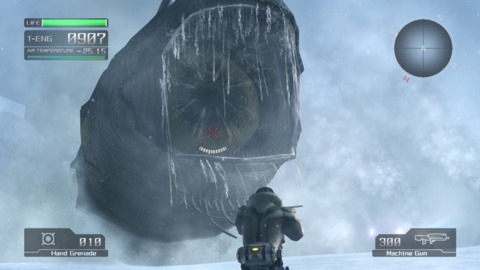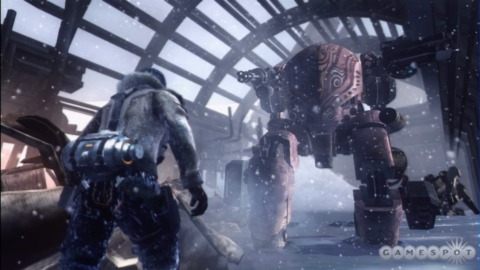Q&A: Scoring Lost Planet
Lost Planet composer Jamie Christopherson talks to GameSpot about the writing process, breaking the language barrier, and the power of silence.
One critical aspect of a game that is often overlooked is its score. While sports games and games like Saints Row and Grand Theft Auto: San Andreas typically opt to use licensed soundtracks, epic action/adventure games rely heavily on original scores to add to the atmosphere.
Composer Jamie Christopherson was asked by Capcom to score the world of Lost Planet: Extreme Condition, an Xbox 360 sci-fi shooter set on an alien world with subzero temperatures. Christopherson previously wrote music for Electronic Arts' Lord of the Rings: The Battle for Middle-earth II, Capcom's Onimusha: Dawn of Dreams, and the film The Crow: Wicked Prayer, but says scoring Lost Planet was his biggest project to date.
GameSpot talked to Christopherson about the writing process, the difference between music in films and games, and how to make a game sound cold.
GameSpot:: What is your music background, and how did you get into writing music for games?

Jamie Christopherson: I've been playing and writing music for as long as I can remember. I started off mostly interested in playing jazz, and that eventually led to me forming my own groups and writing original tunes. When I discovered the impact and power that music had when it was used in films, I instantly knew that I wanted to be a film composer.
Although I played lots of video games in my early days, I never thought of pursuing a career in it because the bleeps and blips didn't really appeal to me as much as film music. So, I went to undergrad to study classical theory at Vassar College and then eventually went back to get a Masters in Film Music from the University of Miami.
Upon moving back to Los Angeles (where I grew up), I ran into a few guys who were writing music for video games. Because I really hadn't paid attention to video game music for the past few years, I was shocked to hear how far the music had come. That was when I seriously considered a career in game music, so I assisted a few game composers, and here I am today.
GS: Tell us briefly about the overall process of writing a score for a game.
JC: My process of writing a score for a game differs a lot from project to project, but they do kind of have the same arc. After I land a project the first thing I usually do is research. If it is a game based on a franchise or time period I will read up as much as I can, and just immerse myself in whatever world it is. Sometimes I get pictures and videos from the game companies, but often it is just descriptions and I have to use my imagination.
The next thing I do is design a palette of sounds as a template that I will use for the majority of the music. Of course, that template will change throughout the process, but it gets me to a point where I can just concentrate on writing music. Often I'll design completely original sounds or record musicians to give the music for that game a unique sonic quality.
GS: How much total music did you compose for Lost Planet, and how long did it take you to write?
JC: Lost Planet was definitely the longest (and one of the largest) projects that I have worked on to date. From when I wrote the original theme to finishing the last cinematic, I've been on the project over two years. The project would be completed in phases, with a few months to break and do other projects in between. The trick with that was to maintain a cohesive sound throughout the music, despite the fact that my gear was constantly being updated during that time. In all I think there is about an hour and a half of music.
GS: How much information was given to you about Lost Planet before you began writing, and how does that information affect what your write?
JC: The information that I had was scarce at the beginning and a lot more detailed toward the end. When writing the main themes for the characters of the game, I only had a rough description of them and some early drawings. The same goes for the early environments. By the last phase, Capcom would be sending me some early versions of video walk-throughs. When I write music without having a video reference, I like to imagine the highest-production-value movie or game in my head.
GS: How do you score really, really cold? Are there any types of instruments that scream out freezing cold temperatures?

JC: For the snow elements of the game (which are pretty much present in most cues) I concentrated on getting a "cold" sound, and also a heavy, weighty sound to represent the characters trudging around in the snow. One thing I did was to design a bunch of cold-sounding synthesizers and musical FX. They needed to sound both "cold" and "futuristic," since the game is science fiction. I also used a lot of traditional orchestral instrument sounds that work well when portraying snow and cold, like certain string FX (harmonics, tremelos), muted horns, and high flutes. You won't find any sleigh bells in the music, though!
GS: How does writing dynamic music change your score?
JC: One thing that we did was to actually use a lot of silence in the game. Silence is another composer's tool that is often overlooked in game music, I think. That way, the player doesn't get bored or annoyed by constantly looping music. Even the best music in the world can get annoying when you hear it too many times in repetition. Also, when the music finally does creep into the game, it can help to really enhance the sense of "something is happening," and hopefully heighten the player's experience.
GS: The game was developed in Japan, but you wrote the music for it in Los Angeles. How did Capcom find you, what sort of language barriers did you have to overcome, and how often did you get a chance to talk with the development team?
JC: This was my second time working for Capcom--the first time being my collaboration on Onimusha: Dawn of Dreams--and I've also worked with many other international clients. They are particularly good with communicating with me about the music. They have several translators who help with e-mail communications, and at the beginning of every "phase" of development they would fly to Los Angeles for meetings. That is always the best approach, to meet in person, and they know it. Capcom really has their stuff together.
GS: I see you are also doing some work on Bladestorm: The Hundred Years' War, a very different game from Lost Planet. How do you approach the score differently for that game?
JC: Bladestorm was a very fun project to work on, as I've always wanted to write music for that time period in history. My favorite Shakespeare play is Henry V, and I also loved the movie of the same name that came out a while ago (not to mention the awesome Patrick Doyle score). Most of the music for the game was very anthemic, with a massive choir often taking the forefront. I drew heavily on my classical harmony training for that game, and it was definitely a blast to work on.
GS: What are the main differences in scoring a film and a game? Do you prefer one over the other?
JC: I prefer to work on projects that challenge me mentally and compositionally, be it games, films, or anything else. The lines between quality films and games have definitely blurred. The main difference in game music is the interactivity of it, and how to approach that to work well. Films are predictable in the fact that I know exactly where my music will be placed, and that won't change each time you watch the movie. Games are fun to write for because they are often epic and powerful. I do love to work on character films and independent films though, and games really don't allow me to write the same style of music.
GS: Do you have an opinion on licensed soundtracks versus original scores?

JC: I think both have their place, and sometimes they can work together. When I worked on the LOTR:BFME I & II for EA Games, they had access to the film score. However, there were new parts of the game that focused on some of the other characters like the Goblins and Dwarves. I came in to come up with original themes and music for these characters, while still [making it sound] like something that would have come from the films. That being said, I think that good original music can help to enhance the player's experience a bit more.
GS: Right now, graphics and gameplay seem to be the top draws for games. Where do you see music fitting in?
JC: For a while the music in games took over on the quality scale, but now the visuals have definitely caught back up. I think the next evolution of music will be to really step it up with originality. That requires support from the whole industry. It especially requires the game developers to take some musical chance[s], instead [of] asking composers to keep copying what has been tried and true for so many years. I think we also need to stop this "bigger and louder" trend somehow.
GS: What are some of your favorite game scores, and who are some of your favorite game-music composers?
JC: When I listen to music, I usually listen to either jazz, classical music, or some film scores. That's not to say that there aren't some truly great game scores out there, but I still don't find them quite as good to listen to outside of the their original context. That being said, a handful of guys like Bill Brown, Michael Giacchino, Christopher Lennertz, and Jeremy Soule are consistently putting out some high-quality music.
GS: Any advice for some of our readers who want to get into your field?
JC: Write music. Read the trade magazines. Go to the conferences. Drink Mountain Dew!
Got a news tip or want to contact us directly? Email news@gamespot.com
Join the conversation